Ijraset Journal For Research in Applied Science and Engineering Technology
- Home / Ijraset
- On This Page
- Abstract
- Introduction
- Conclusion
- References
- Copyright
A Study of “The Growth of AI in Digital Marketing Platform”
Authors: Syed Murtuza Abbas Zaidi, Dr. Radhakrishna M.
DOI Link: https://doi.org/10.22214/ijraset.2024.62326
Certificate: View Certificate
Abstract
The purpose of the current research paper is to provide a review of previous studies that have explored the important role of artificial intelligence (AI) in digital marketing. AI has become a powerful and powerful tool to transform many industries, including marketing. By helping companies analyze large amounts of data, identify patterns and make decisions, artificial intelligence has dramatically changed the way businesses engage with consumers online. This research paper followed the library research method as 26 research papers related to the topic were reviewed. All research papers reviewed were published between 2017 and 2023. This paper discussed how artificial intelligence technology can change the nature of digital marketin, enabling companies to improve the customer experience, optimize campaigns and improve good marketing. We also cover various uses ofartificial intelligence in digital marketing, including custom content development, chatbots for customer support, predictive analytics for segmentation and segmentation, and recommendation engines for product ideas. The study also highlighted the advantages and disadvantages of incorporating AI into digital marketing. This article focuses on the interesting connections between digital marketing and artificial intelligence (AI) and how they can be driven by new trends. It is a technology that claims and uses AI to contribute to application development. Digital marketing, a true branch of marketing science, has created value for organizations and enhanced customer engagement through eservices. The emergence of technology has created a new competitive field for digital marketing and brought rapid changes in digitization. The market around the world is using digital technologies to improve the service levels that companies offer to customers. In marketing, artificial intelligenceenables intelligent search engines, intelligent advertising, intelligent content delivery, use of bots, continuous learning, fraud and data breach prevention, style and language recognition, sales forecasting, language awareness,predictive service to the customer and segmentation of significant opportunities. etc. Intelligent intelligence enables companies to improve sales and profits by understanding and understanding customer needs.
Introduction
I. INTRODUCTION:
In the long term, artificial intelligence (AI) will become a key component of every industry in the world. The biggest changes in the AI ecosystem can be seen in the latest developments in AIbased engineering. This can be seen in company's new concepts, goals and financial commitments in the area of AI adoption. With its ability to detect faces and objects, the technology is very advanced and has many business applications. While object detection can be used to segment and analyze images, facial recognition can be used for security purposes to distinguish individuals. Artificial intelligence on human profiles works in the same way as cookies, which enable other personalized services based on user preferences. Companies are experimenting with facial recognition software to determine a customer's personality and recommend suitable products.
In digital marketing, AI focuses on lead conversion and user retention. Interactive website design, smart email marketing, insightful conversations and other digital marketing services can help you drive users towards your business goals. The impact of AI on digital marketing will be determined by many factors. Machine learning (ML), a subset of AI, teaches computer programs that can collect data and use it to learn about itself. We collect information from various sources, including websites, online reviews, menus and social media accounts. AI uses data to create and deliver tailored content to viewers. Artificial intelligence technology enables comprehensive online research for restaurants and customers.By using AI in their marketing plans, businesses can provide them with more data and connect with potential customers at better times.
Through social networks such as Facebook and Instagram and artificial intelligence for advertising on digital platforms, digital marketing provides a unique and enjoyable experience for consumers. These platforms review user data before making offers that meet the user's needs. AI can also help marketers predict and spot trends. This will ensure your money is spent and prevent your business from being overwhelmed by digital advertising. Computer vision is the process by which computers recognize objects, features, and actions in images. Application areas include facial recognition, medical image analysis, public safety and security monitoring. When computer vision and artificial intelligence are properly combined, robots can predict future events and act appropriately based on potential changes.
AI makes it easy to create customer profiles and understand the customer journey. This enables brands to quickly and easily provide intelligent and personalized information to customers at all levels of the marketing funnel and across all channels. Artificial intelligence systems in digital marketing can identify what is most likely to drive usersback to your website based on historical data. AI determines which customers will unsubscribe from a service and analyzes general subscriber characteristics. These statistics help marketers plan their next campaign and strategize to encourage people to stick around.
II. VARIOUS APPLICATIONS OF ARTIFICIAL INTELLIGENCE (AI) IN DIGITAL MARKETING
A. Customer Segmentation
Kotler and Keller (2016) argue that customer segmentation helps companies determine the most profitablecustomer segments, create targeted marketing efforts, and allocate resources to be better. AI algorithms allow marketers to better segment audiences by analyzing demographics, online behavior patterns, and social media interactions (Smith et al., 2019). By identifying specific customer segments based on their wants and needs, marketers can tailor messages to appeal to each group individually.
B. Personalized Advertising
Digital marketing is different from the way AI has changed other industries.Personalized ads are offers designed for each individual customer and placed alongside website content to integrate with the website they are viewing.Personal advertising allows companies to reach customers with relevant offers. Marketers are currently spending money on advertising because they see good results.
AI recommendation systems use machine learning algorithms to deliver personalized ads to consumers. These systems analyze user behavioral data to understand their individual needs and deliver relevant ads that convert them into sales. Personalized ads not only improve user experience, but also increase conversion rates for businesses.
C. Content Creation:
Gagnon (2014) suggests “show what you know” when creating content to promote a business and its goods or services. Developing content that educates audiences about what the organization "knows" should be part of any company's strategy. According to Gagnon (2014), "knowledge" refers to "improving organizational knowledge" that should be useful, entertaining, and competitively relevant. This should allow the content to remain in the minds of the viewers so that they return to the company to fulfil their needs (Ibid). Artificial intelligence technologies such as natural language processing (NLP) have made significant progress in automatically generating high-quality content.
D. Chatbots
In digital marketing platforms, chatbots are artificial intelligence-based software programs that provide customers with instructions on how to interpret human actions and trigger conversational questions in natural language. In addition to being used for conversations, chatbots are also used by professionals in established fields such as doctors and lawyers. In addition to other human rights issues, classification, civil liability, consumer protection, cybersecurity, privacy and data protection, and intellectual property rights (IPR) are considered..
E. Data Analysis
AI algorithms can process and analyze large amounts of data in real time, providing marketers with insights into customer behavior and needs. Marketers can use AI..based data analytics to gain a competitive advantage by understanding customer needs and benefiting from their marketing efforts.
III. LITERATURE REVIEW
Gary Armstrong and Philip Kotler's "Artificial Intelligence and the Future of Digital Marketing". The possible drawbacks of AI for digital marketing are covered in this article, including the loss of human interaction and the development of a one-size-fits-all marketing strategy.
Joseph Pigato's "The Dark Side of AI in Digital Marketing" The possible harm that AI could do to consumer privacy, particularly with regard to the gathering and use of personal data, is the main topic of this article.
Jenny Sussin's "AI Bias in Digital Marketing" This article examines the issue of AI bias in digital marketing and how it may result in unfair business practices that harm particular customer groups.
David Fowler's "The Dangers of AI in Digital Marketing" This article addresses the possible drawbacks of using artificial intelligence (AI) in digital marketing, including a decline in originality and innovation.
Alex van der Hoeff's "AI and the Ethics of Digital Marketing" The ethical ramifications of employing AI in digital marketing are covered in this essay, along with questions of accountability and transparency.
Sumeet Anand's article "AI and the Future of Personalisation in Digital Marketing" The use of AI to personalise digital marketing campaigns is examined in this article, along with some possible drawbacks including privacy invasion.
Praveen Kumar's article "The Rise of AI in Digital Marketing: Opportunities and Challenges “The possible advantages and disadvantages of utilising AI in digital marketing are covered in this article, along with concerns about data security and privacy.
Giselle Abramovich’s book "AI and the Future of Digital Advertising" This article explores the possible drawbacks of artificial intelligence (AI) for digital advertising, including the production of inaccurate or deceptive information.
Alex Chris's article "AI and the Future of SEO: Opportunities and Risks" This article addresses the possible drawbacks of AI, such as the production of low-quality material, while also examining how it might be utilised to enhance SEO efforts.
Emily Walters' article "The Unintended Consequences of AI in Digital Marketing" The unexpected effects of utilising AI in digital marketing are discussed in this article, including the possibility of inadvertently inappropriate or damaging content being created.
IV. OBJECTIVES OF RESEARCH
- Identify the factors that influence artificial intelligence in digital marketing.
- Forecasting and predicting the future success of artificial intelligence.
- Analyzing the impact of artificial intelligence in the world of marketing.
V. HYPOTHESIS
H1) Incorporating AI technology into your digital marketing strategy will increase customer engagement and increase conversion rates.
H2) AI.based content optimization technology drives content and effectiveness, increasing viewer satisfaction and engagement.
H3) Adopting AI campaign management tools will improve performance and optimize resources in digital marketing.
VI. FUTURE SCOPE OF THE STUDY
In the future, marketers can expect the following impact of artificial intelligence on digital marketing.
A. Smarter Searches
It is important to mention that as technical solutions become more sophisticated and comprehensive, the needs of the public will increase. People can quickly find what they need thanks to social media and fast search engineslike Google.
Artificial intelligence and big data can help analyze these search patterns and identify key areas where marketers should focus their efforts.
B. Smarter Ads
Marketers today are still trying to attract customers with intelligent advertising, but with intelligent advertisin they can do it faster and better. Big data has made online advertising easier and more efficient. For human solutions, AI can delve into data, social media, information and other online information.
C. Depending on Bots
Another area where artificial intelligence will play an important role in development is customer managemen and retention. Communication situations and other direct actions with customers can be quickly handled by smart bots. In this way, companies can save staff time and reduce costs. In addition, intelligent robots can access information and search history from the Internet, making them more efficient than humans.
D. Continuous Learning
Using artificial intelligence, we not only reveal some hidden data, but also target and incorporate it into new promotion strategies and optimize messages to the right users. AI solutions will become smarter and more effective over time, making it easier to make real-time decisions.
VII. RESEARCH METHODOLOGY
This paper is a research or descriptive study on a specific topic. The methodology that underpins the research is qualitative and, above all, descriptive. In this study, we explore the views of people who use AI in the context of AI tools used in marketing previously constant connection with them.
This is a research and explanation study, so we aim to understand the strategies, advantages, challenges presented and ethical issues of companies using AI,as well as the impact of these actions on their company.
Money Since the aim of this study is to contribute and be a supporting document for companies to implement successful AI strategies in the market, it is considered necessary to know what are the most important factors for the successful implementation of AI strategies in the market.
The first phase of the study provided a theoretical foundation based on secondary data from academic articles, journals, reports and books. In the second phase, the first collection of data was carried out for analysis and conceptualization.
A. Type of Data Collection
- Research: Research digital marketing experts or industry experts to gather quantitative data on AI adoption, intelligence and effectiveness in digital marketing.
- Interviews: Conduct semistructured interviews with digital marketing experts, AI developers, and industry leaders to learn about AI implementation strategies, challenges, and best practices.
B. Sample size
53 people (digital and industrial traders)
C. Analysis methods
Data analysis tools: Use statistical software such as SPSS and Excel for quantitative analysis of data research, including descriptive statistics.
D. Sample unit
The Linkedin group was selected as the sample unit. The survey was conducted between February and March 2024.
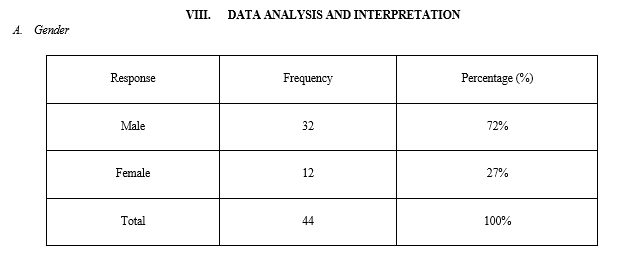
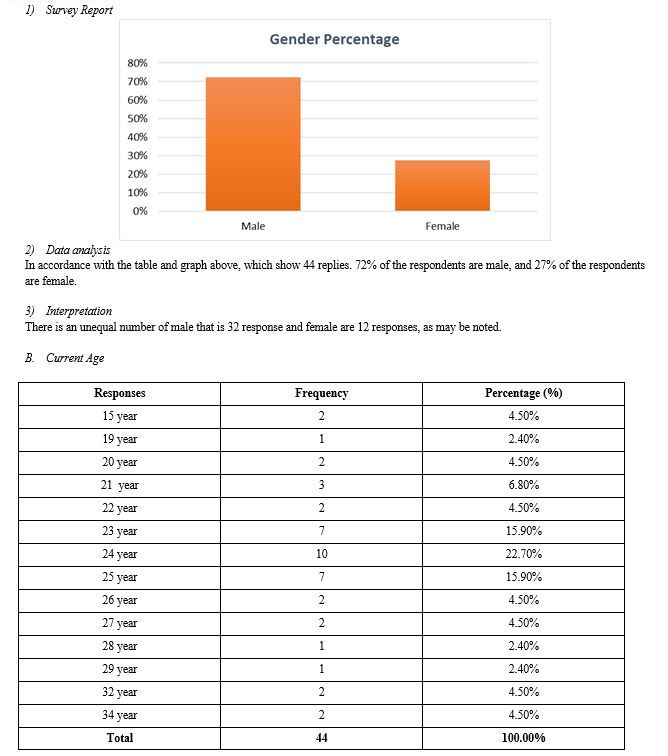
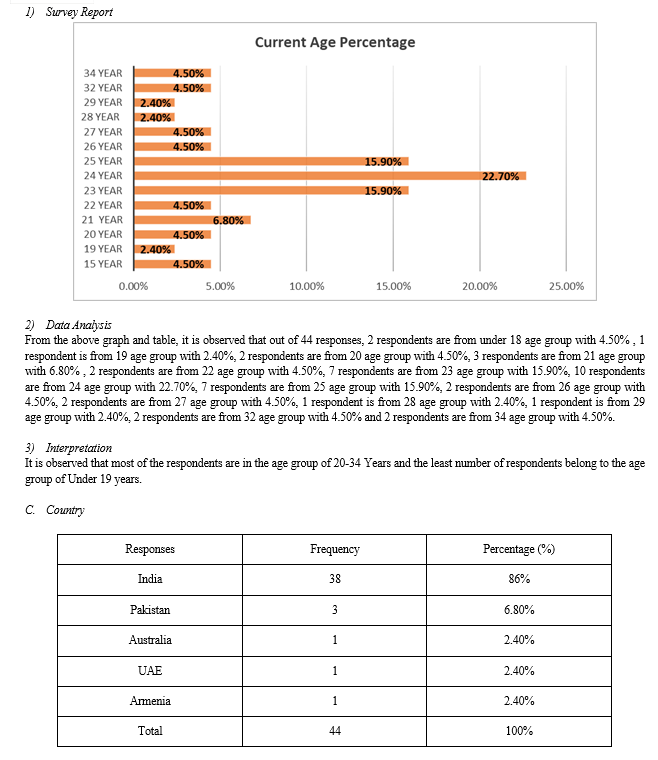
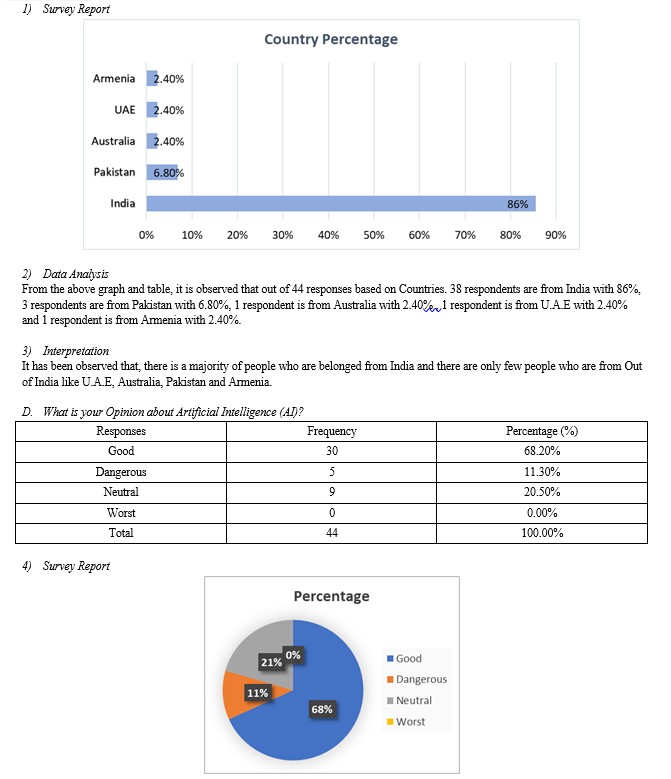
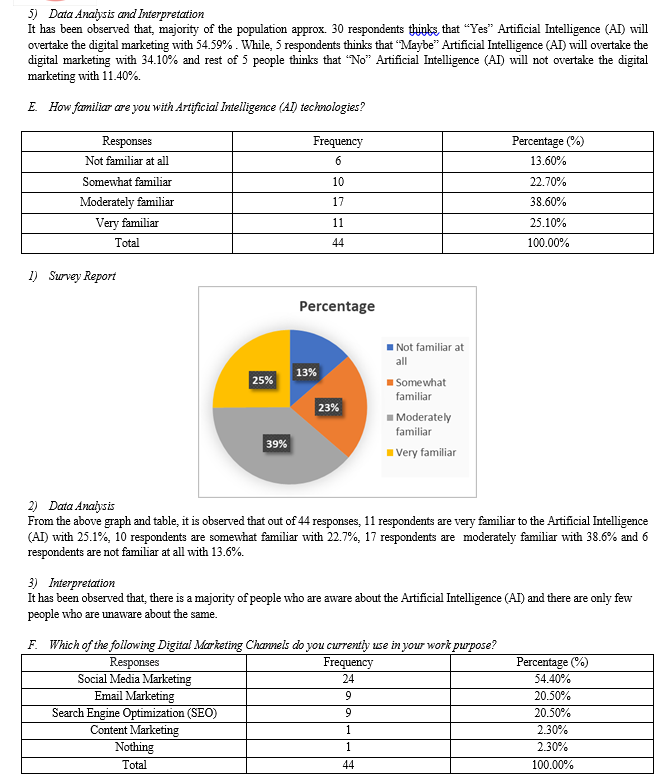
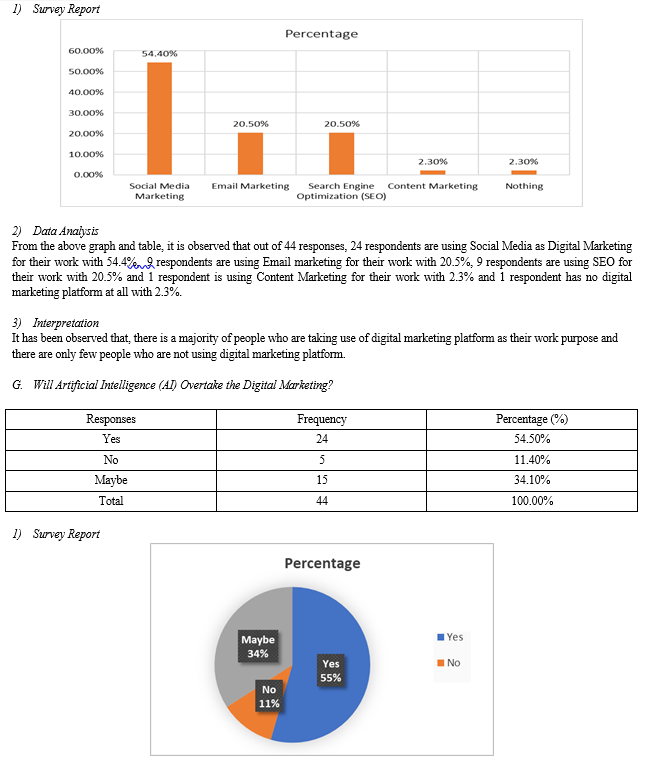
2) Data analysis and Interpretation
It has been observed that, majority of the population approx. 24 respondents thinks that “Yes” Artificial Intelligence (AI) will overtake the digital marketing with 54.59% . While, 15 respondents thinks that “Maybe” Artificial Intelligence (AI) will overtake the digital marketing with 34.10% and rest of 5 people thinks that “No” Artificial Intelligence (AI) will not overtake the digital marketing with 11.40%.
IX. FINDINGS
A. Identifying Key Digital Marketing Technologies
Machine learning algorithms are the most widely used AI technology in digital marketing strategies. Natural language processing (NLP) and predictive analytics also play an important role in improving marketing efficiency by analysing consumer sentiment and predicting future trends.
Chatbots and virtual assistants are becoming popular AI-based tools for customer engagement and support in digital marketing.
B. Evaluating the impact of AI-based personalization
AI-based personalization has a significant positive impact on customer engagement, leading to greater interaction and brand loyalty. AI-based personalization also has a positive impact on conversion, as personalized content and offers resonate more effectively with the target audience.
Overall marketing efficiency improves with AI-powered personalization as campaigns become more relevant and targeted, improving ROI and customer satisfaction.
C. Exploring Challenges and Barriers to AI Adoption
Organizational resistance to change is a common barrier to widespread adoption of AI in digital marketing, and many companies face internal resistance to adopting new technologies. Data protection issues present significant challenges, especially in industries that handle sensitive customer data, such as healthcare and finance. The shortcomings of AI technology hinder adoption, as many marketers lack the knowledge needed to effectively use AI tools and algorithms in their campaigns.
X. LIMITATIONS OF RESEARCH
- Limited data Availability: Due to the relatively recent emergence of AI in digital marketing, there may be limited empirical data for in-depth analysis, especially on long-term effects and results.
- Quality and Quantity of Data: Digital Marketing AI relies heavily on data. If the data used to train AI models is incomplete, biased or of poor quality, it can lead to inaccurate predictions and decisions.
- Understanding context and Nuance: While AI can analyse vast amounts of data, it can be difficult to understand context and nuance in certain situations, especially in areas that require human intuition or cultural understanding.
- Creativity and Emotional Intelligence: AI can help with content creation and sentiment analysis, but it often lacks the creativity and emotional intelligence of humans. This can limit his ability to create truly effective and emotional marketing campaigns.
- Data Protection Issues: AI-based marketing techniques often rely on extensive data collection, raising privacy and data security concerns. Tighter regulations and consumer backlash against invasive data collection practices could limit the effectiveness of AI in digital marketing.
XI. SUGGESTIONS AND RECOMMENDATIONS:
- Focus on Global Applications: Organize research focused on the global applications of AI in digital marketing to provide practical advice to businesses and marketers. It includes real-world examples and case studies to demonstrate the effectiveness of AI strategies and techniques.
- Address Ethical Considerations: Be aware of ethical considerations related to the adoption of AI in digital marketing, including data privacy, transparency, and algorithmic settings. It provides advice and guidance on the ethical use of AI to mitigate risks and challenges.
- Development and Training: Emphasizes the importance of skill development and training for marketing professionals to effectively use AI technology. Provides resources and recommendations for building AI-related skills to fill skill gaps and successfully advance AI.
- Collaboration and Knowledge Sharing: Increases understanding of artificial intelligence in the digital marketplace by fostering collaboration and knowledge sharing between researchers, industry professionals and academic institutions. We encourage dialogue and the exchange of ideas to drive innovation and best practices in the integration of AI into the digital market landscape.
Conclusion
Take a look at on the \"Growth of the Artificial Intelligence (AI) in Digital Marketing Platform” How Ai is used for Digital work purpose either in Government sector or Private companies. Some of the uses of Artificial Intelligence (AI) application can effect on people life day to day routine. Artificial Intelligence (AI) have so many benefits and positive plus negatives impact to the personal life. The world of digital marketing is changing as a result of Artificial Intelligence (AI). Looking at recent research (2017to2023), this review study explored the importance of AI in digital marketing. In this paper, we discuss many ways to apply AI in digital marketing, including chatbots, automated content creationfor digital marketing, personalized advertising, customer segmentation for targeted marketing campaigns and personalized advertising, are a big challenge for consumers. Digital marketers balance personalized advertising experiences with respect for user privacy.The study also discussed the main benefits and potential drawbacks of incorporating AI into digital marketing strategies. As AI advances, digital marketers must stay abreast of the latest developments and leverage AI technology to achieve business success. In addition, applying AI to digital marketing requires a significant financial investment. Implementing AI can be difficult for small businesses with limited resources and limited budgets. Failure to quickly adapt to AI can lead to missed opportunities or ineffective strategies, and demonstrates the need for continuous learning and professional development at the digital marketing level. AI has made it possible to automate many tasks in digital marketing. However, it is still necessary to understand the importance of human creativity and know how to create an effective marketing campaign. In conclusion, while AI\'s potential to improve digital marketing remains to be seen, relying on AI can remove the human touch and authenticity and negatively impact consumer engagement and brand loyalty.
References
[1] Su?kowski, ?., & Kaczorowska-Spychalska, D. (2021). Determinants of the adoption of AI wearables - practical implications for marketing. Human Technology, 28. [2] Hah, H., & Goldin, D. S. (2021). How Clinicians Perceive Artificial Intelligence–Assisted Technologies in Diagnostic Decision Making: Mixed Methods Approach. Journal of Medical Internet Research, 20. [3] Huang and Rust (2021), Journal of Retailing, A Framework for Collaborative Artificial Intelligence In Marketing. [4] Chaffey & Ellis-Chadwick (2019),The impact of artificial intelligence in digital marketing. [5] Khatri (2021), Artificial Intelligence on digital Marketing-An overview. Natural Volatiles & Essential Oils, 14. [6] Russel and Norvig (2016), Artificial intelligence: A modern approach (3rd ed.), Pearson Education Limited. [7] Campbell, C., Sands, S., Ferraro, C., Tsao, H.Y.J., & Mavrommatis, A. (2020). From data to action: How marketers can leverage AI. Business Horizons [8] Smith., S. (2018), Juniper Research: Retailer Spending on AI to Grow Nearly Fourfold, Reaching $7.3 Billion by 2022, Businesswire, viewed 30 March 2021. [9] Keiningham, T., Ball, J., Benoit, S., Bruce, H.L., Buoye, A., Dzenkovska, J., & Zaki, M. (2017). The interplay of customer experience and commitment. Journal of Services Marketing. [10] Kiran Nair (2021), Application of AI technology in modern digital marketing environment. World Journal of Entrepreneurship, Management and Sustainable Development, 318-328.
Copyright
Copyright © 2024 Syed Murtuza Abbas Zaidi, Dr. Radhakrishna M.. This is an open access article distributed under the Creative Commons Attribution License, which permits unrestricted use, distribution, and reproduction in any medium, provided the original work is properly cited.

Download Paper
Paper Id : IJRASET62326
Publish Date : 2024-05-18
ISSN : 2321-9653
Publisher Name : IJRASET
DOI Link : Click Here
 Submit Paper Online
Submit Paper Online

